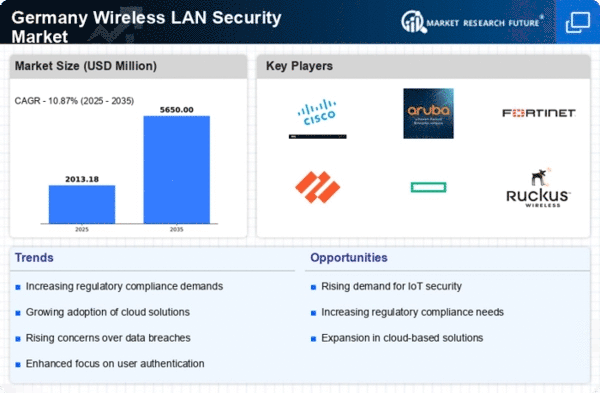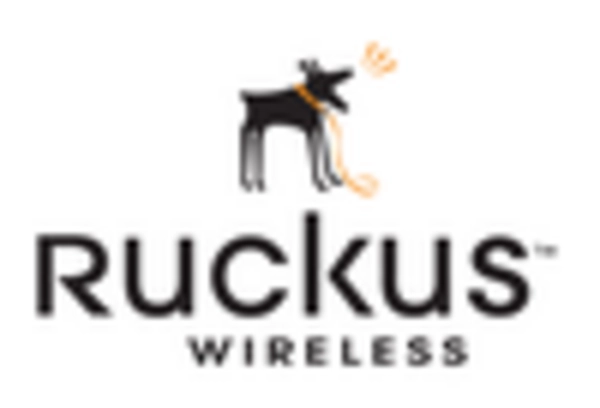Growing Remote Work Culture
The shift towards remote work in Germany has significantly impacted the wireless lan-security market. As more employees access corporate networks from home or public locations, the risk of unauthorized access and data breaches has escalated. This evolving work environment necessitates the implementation of secure wireless solutions to safeguard sensitive information. According to recent studies, approximately 60% of German companies have reported an increase in cyber threats associated with remote work. This trend underscores the importance of investing in wireless security technologies, as organizations seek to protect their data and ensure secure connectivity for remote employees. The wireless LAN security market is thus poised for growth. Businesses are adapting to this new normal.
Rising Cybersecurity Threats
The wireless lan-security market in Germany is experiencing heightened demand due to the increasing frequency and sophistication of cyber threats. Organizations are recognizing the necessity of robust security measures to protect sensitive data and maintain operational integrity. In 2025, it is estimated that cybercrime could cost businesses globally over $10 trillion annually, prompting German companies to invest heavily in wireless security solutions. This trend indicates a growing awareness of the vulnerabilities associated with wireless networks, leading to a surge in the adoption of advanced security protocols and technologies. As a result, The wireless LAN security market is likely to expand significantly. This growth is driven by the urgent need for effective defense mechanisms against potential breaches.
Regulatory Compliance Requirements
In Germany, stringent regulatory frameworks such as the General Data Protection Regulation (GDPR) are compelling organizations to enhance their wireless security measures. Compliance with these regulations is not merely a legal obligation but also a critical factor in maintaining customer trust and brand reputation. The wireless LAN security market is thus witnessing increased investments. Businesses are striving to meet these compliance standards. Failure to adhere to regulations can result in hefty fines, which can reach up to €20 million or 4% of annual global turnover, whichever is higher. Consequently, the pressure to comply is driving organizations to adopt comprehensive wireless security solutions, thereby propelling market growth.
Increased Awareness of Data Privacy
There is a growing awareness of data privacy issues among consumers and businesses in Germany, which is significantly influencing the wireless lan-security market. As individuals become more conscious of their personal data rights, organizations are compelled to implement stringent security measures to protect customer information. This shift in consumer expectations is driving businesses to prioritize wireless security solutions that ensure data protection and compliance with privacy regulations. Surveys indicate that over 70% of German consumers are concerned about their data privacy, prompting companies to invest in robust wireless security measures. Consequently, this heightened awareness is likely to fuel the growth of the wireless lan-security market as organizations strive to meet consumer demands for enhanced data protection.
Technological Advancements in Security Solutions
The wireless lan-security market is benefiting from rapid technological advancements that enhance the effectiveness of security solutions. Innovations such as next-generation firewalls, intrusion detection systems, and advanced encryption methods are becoming increasingly prevalent in the market. In Germany, the adoption of these technologies is expected to grow by approximately 25% over the next five years, as organizations seek to bolster their defenses against evolving threats. These advancements not only improve the security posture of wireless networks but also offer greater flexibility and scalability for businesses. As a result, the wireless lan-security market is likely to expand as companies invest in cutting-edge technologies to stay ahead of potential cyber threats.
















